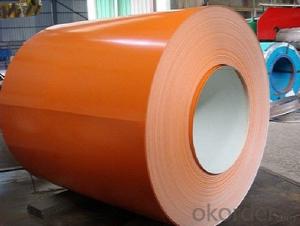Color Rolled galvalume Steel Coil for Roof
- Loading Port:
- Shanghai
- Payment Terms:
- TT OR LC
- Min Order Qty:
- 25 m.t.
- Supply Capability:
- 30000 m.t./month
OKorder Service Pledge
OKorder Financial Service
You Might Also Like
Structure of Color Rolled Galvalume Steel Coil for Roof
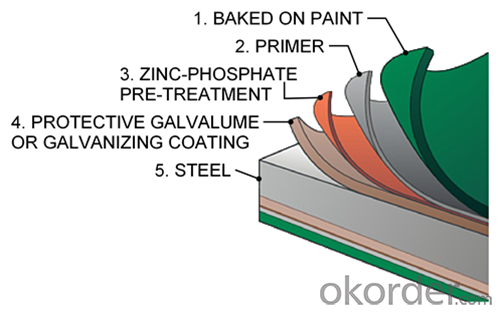
Description of Color Rolled Galvalume Steel Coil for Roof
Aluminum zinc coils is a kind of coated steel coil/sheet. With the cold rolled steel of different strength and thickness as substrate, it is produced through applying Al-Zn coat on both faces by hot dip process. In its coating, Al accounts for about 55%, Si 1.6%, while the remaining is Zn. Aluminum zinc coils enjoys both the physical protective feature and durability of Al and the electrochemical protective property of Zn. And its surface has bright silver color and regular embossed-like figure, which are highly decorative.
Main Feature of Color Rolled Galvalume Steel Coil for Roof
1.Corrosion resistance: It mainly depends on the aluminum protection. When the zinc being worn, the aluminum will form a dense layer of aluminum oxide, resist corrosion material to prevent further corrosion inside.
2. Heat resistance: Aluminum zinc alloy steel sheet has excellent heat resistance, can withstand high temperatures over 300 centigrade, and is similar with aluminized steel high temperature oxidation resistance. It often used in chimney pipes, ovens, fluorescent lighting device and the device cover.
3. Heat reflective: Galvanized steel plate heat-reflective high rate is twice as galvanized steel, often used to make insulation materials.
4. Economy: Because density of 55% AL-Zn is smaller than the density of Zn, so in the same weight and thickness of Galvanized zinc layer, aluminum-zinc steel plate is larger area more than 3% of galvanized steel sheet.
Applications of Color Rolled Galvalume Steel Coil for Roof
1. Construction and building: roofing; ventilating duct; handrail; partition panel;etc.
2. Electric appliance: refrigerator; washing machine; refrigerator; DVD;etc.
3.Transportation: oil tank; road sign; etc.
4.Agriculture:barn; etc.
5.Others:vending machine; game machine; etc.
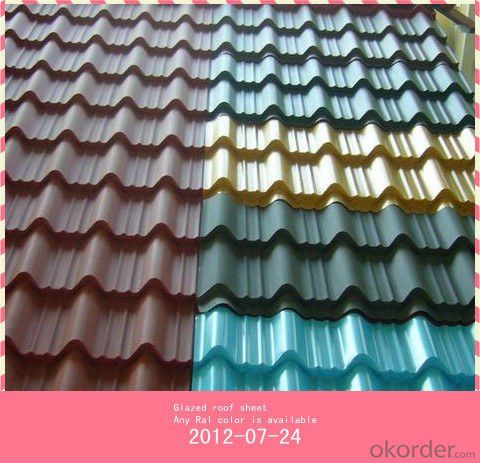
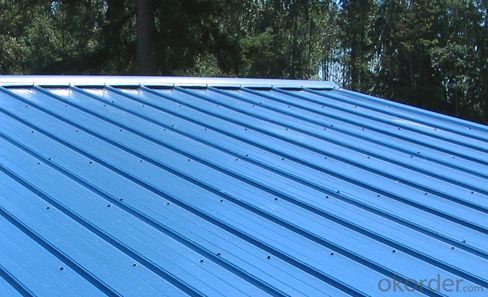
Color Rolled Galvalume Steel Coil for Roof Images
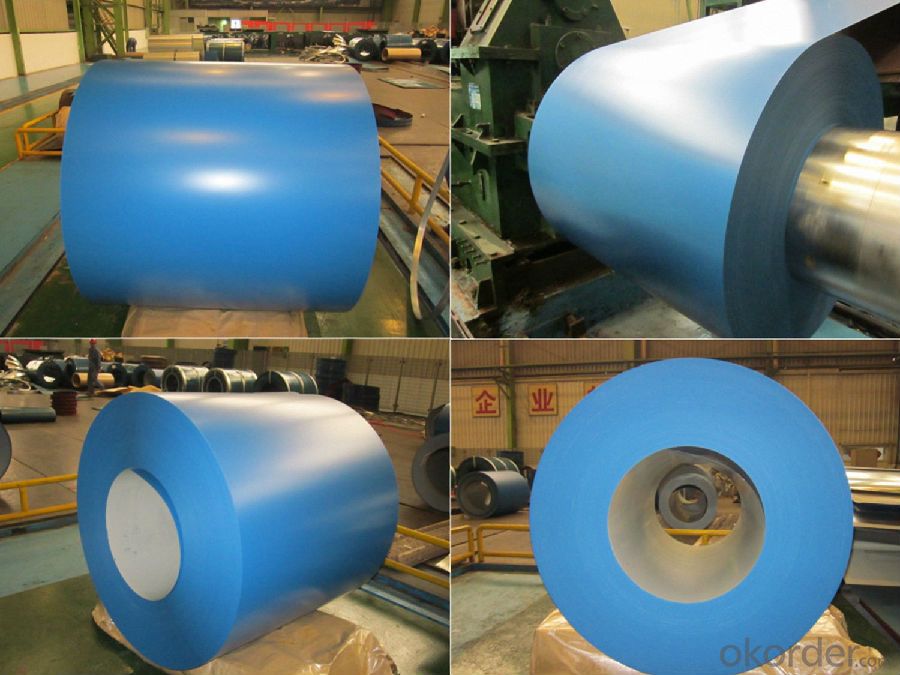
Specifications of Prepainted Aluminum Zinc Rolled Coil for Construction
Chemical Composition | ||||||
GRADE | C | Si | Mn | P | S | Ti |
SGCC/DX51D+Z | ≤0.10 | ≤0.50 | ≤0.60 | ≤0.10 | ≤0.030 | ≤0.020 |
DX52D+Z | ≤0.10 | ≤0.50 | ≤0.60 | ≤0.10 | ≤0.030 | ≤0.020 |
SGCD/DX53D+Z | ≤0.10 | ≤0.30 | ≤0.50 | ≤0.05 | ≤0.030 | ≤0.020 |
SGCE/DX54D+Z | ≤0.10 | ≤0.30 | ≤0.30 | ≤0.03 | ≤0.020 | ≤0.020 |
DX56D+Z | ≤0.10 | ≤0.30 | ≤0.30 | ≤0.03 | ≤0.020 | ≤0.020 |
Structural | ≤0.20 | ≤0.60 | ≤1.70 | ≤0.10 | ≤0.045 | |
Mechanical Properties | ||||||
GRADE | Yield Strength MPa | Tensile Strength MPa | Elongation % | |||
SGCC(DX51D+Z) | ≥205 | ≥270 | - | |||
SGCD(DX53D+Z) | - | ≥270 | 38 | |||
SGCE(DX54D+Z) | - | ≥270 | 40 | |||
DX56D+Z | - | ≥270 | 42 | |||
FAQ of Prepainted Aluminum Zinc Rolled Coil for Construction
We have organized several common questions for our clients,may help you sincerely:
1. What is the minimum order quantity ?
Our MOQ is 50mt for each size. And we will consider to give more discount if you make big order like 1000 tons and more. Further more, the more appropriate payment term your offer the better price we can provide.
2. How long can we receive the product after purchase?
Usually within thirty working days after receiving buyer’s advance payment or LC. We will arrange the factory manufacturing as soon as possible. The cargo readiness usually takes 15-25 days, but the shipment will depend on the vessel situation.
3. How to guarantee the quality of the products?
We have established the international advanced quality management system,every link from raw material to final product we have strict quality test;We resolutely put an end to unqualified products flowing into the market. At the same time, we will provide necessary follow-up service assurance.
- Q:What are the different types of steel coil finishes?
- There are several different types of steel coil finishes, including mill finish, galvanized finish, painted finish, and stainless steel finish.
- Q:How are steel coils inspected for paint adhesion?
- Steel coils are inspected for paint adhesion through various methods such as visual examination, tape test, and cross-cut adhesion test. These tests involve visually inspecting the surface for any paint defects, applying adhesive tape to check if the paint adheres properly, and making cross-cuts to assess the adhesion strength.
- Q:I need new sprockets on my GSX-R1, I've heard that alumnium sprockets wear out twice as fast as steel and the difference is not noticable
- I find it hard to imagine the weight savings would ever be noticeable enough to justify using a less durable metal. You also need to figure the time spent replacing sprockets and it's possible a worn rear would cause early wear to the chain and then to the countershaft sprocket. You can also change your gear ratio easier by going down one tooth on the front instead. You just have to work the numbers. I've found it to be a simpler way to change the performance to meet that days needs. Keep it sunny side up!
- Q:Can steel coils be used in the manufacturing of machinery and equipment?
- Machinery and equipment manufacturing can indeed utilize steel coils effectively. These coils possess remarkable versatility and contribute strength, durability, and stability to various industrial applications. They can be manipulated to assume various shapes, receive cuts, and undergo formation to generate diverse parts and components that are indispensable to the manufacturing process of machinery and equipment. Gears, shafts, frames, brackets, and other structural elements are commonly produced using steel coils. Moreover, these coils can undergo further processing to fashion specialized components like springs or fasteners. By incorporating steel coils into machinery and equipment manufacturing, the end products are guaranteed to possess exceptional quality, capable of enduring heavy loads, and boasting an extended lifespan.
- Q:y does 1095 steel on a katana weight about a pound less for the same amount than 1045? the 1095 is better right? but then why is 1045 steel more comenly used for practical use than 1095, even though i no its cheaper to use 1045 for tami mats. so is 1095 steel the better investment for buying and minor tami mat use?
- Steel grades generally tell you how much carbon is in the steel. The higher the number the more carbon. Aside from quality of manufacture, the better swords tend to be 1060 or more. Few quality swords are made from 1045. Which DOES NOtT hold an edge better (quite the reverse). Swords made of these different steels weigh about the same. That is, if you made two identical looking swords - one of 1095 the other of 1045, they would weigh the same. 1045 is only more commonly used because cheaper swords tend to be made from it. Edit: No real swords are made from stainless steel.
- Q:What are the factors affecting the formability of steel coils?
- There are several factors that can affect the formability of steel coils, including the composition and microstructure of the steel, the thickness and width of the coils, the temperature at which the forming process takes place, the lubrication used during forming, and the equipment and techniques employed.
- Q:How are steel coils used in the production of furniture?
- Steel coils are commonly used in the production of furniture as they provide strength, durability, and stability. These coils are typically used in the construction of furniture frames, providing a solid foundation for cushions and upholstered components. Additionally, steel coils can be used in the manufacturing of springs, which are essential for providing comfort and support in mattresses, sofas, and other upholstered furniture pieces.
- Q:My boyfriend is a loyal follower of this guy called Dr. Steel.
- Dr. Steel is an extremely complex phenomenon, a bit of a metaphorical nesting doll. On the surface, Dr. Steel can appear to some as simply a method actor musician with an over-the-top gimmick. Just underneath that facade lies an enigma; he makes some people wonder if he's really serious, just trying to entertain, or completely barking mad. But underneath the second facade, Dr. Steel is really acclaimed comic-book writer and chaos magickian, Grant Morrison. Make no mistake, he really thinks he is Dr. Steel. He has taken method acting and ceremonial magick to the highest levels, and fully intends to take over (or make over) the world. What's more, in the three short years since handing over his comic-book authorship to a ghost writer, he has amassed tens of thousands of followers worldwide. I've done several polls among Dr. Steel fans, and the results show that for every one person who has officially signed up, there are ten more loyal followers who have not.
- Q:How are defects in steel coils repaired?
- Defects in steel coils are repaired through various methods depending on the type and severity of the defect. Common repair techniques include grinding, welding, soldering, or using heat treatment processes to correct the defects. The specific approach is determined by professionals after assessing the nature of the defect and considering the desired quality and performance standards of the steel coils.
- Q:What are the common methods of testing the durability of steel coils?
- There are several common methods used to test the durability of steel coils. These methods evaluate the strength, performance, and resistance of steel coils to various stresses and conditions. Some of the most widely used methods include: 1. Tensile testing: This method involves subjecting steel coils to tension until they fail. It measures the maximum stress a coil can withstand before breaking or deforming. Tensile testing provides valuable information about the strength and ductility of steel coils. 2. Bend testing: This method evaluates the flexibility and resistance to deformation of steel coils. It involves bending the coil to a specified angle and examining whether it cracks or fractures. Bend testing is essential to assess the durability of coils in applications that involve bending, such as construction or automotive industries. 3. Impact testing: This method assesses the ability of steel coils to withstand sudden shocks or impacts. It involves striking the coil with a heavy object and measuring the energy absorbed or the extent of deformation. Impact testing is crucial in determining the toughness and resistance of coils to sudden loading conditions. 4. Corrosion testing: Steel coils are often exposed to corrosive environments, such as moisture or chemicals. Corrosion testing evaluates the resistance of steel to degradation caused by these corrosive agents. Methods like salt spray testing or electrochemical testing are commonly used to simulate and assess the durability of steel coils in corrosive conditions. 5. Fatigue testing: This method evaluates the ability of steel coils to withstand repeated loading and unloading cycles. It involves subjecting the coil to cyclic stresses until it fails. Fatigue testing is crucial in industries where coils are subjected to repetitive loading, such as in machinery or infrastructure applications. 6. Hardness testing: This method measures the resistance of steel coils to indentation or scratching. It provides information about the strength and wear resistance of the material. Common hardness testing methods include Brinell, Rockwell, and Vickers hardness tests. 7. Non-destructive testing: In addition to destructive testing methods mentioned above, non-destructive testing techniques are also used to evaluate the durability of steel coils. These methods, such as ultrasonic testing, magnetic particle inspection, or X-ray testing, allow for the detection of internal defects or flaws without damaging the coil. By employing these testing methods, manufacturers and industries can ensure that steel coils meet the required durability standards and perform reliably in their intended applications.
1. Manufacturer Overview |
|
|---|---|
| Location | |
| Year Established | |
| Annual Output Value | |
| Main Markets | |
| Company Certifications | |
2. Manufacturer Certificates |
|
|---|---|
| a) Certification Name | |
| Range | |
| Reference | |
| Validity Period | |
3. Manufacturer Capability |
|
|---|---|
| a)Trade Capacity | |
| Nearest Port | |
| Export Percentage | |
| No.of Employees in Trade Department | |
| Language Spoken: | |
| b)Factory Information | |
| Factory Size: | |
| No. of Production Lines | |
| Contract Manufacturing | |
| Product Price Range | |
Send your message to us
Color Rolled galvalume Steel Coil for Roof
- Loading Port:
- Shanghai
- Payment Terms:
- TT OR LC
- Min Order Qty:
- 25 m.t.
- Supply Capability:
- 30000 m.t./month
OKorder Service Pledge
OKorder Financial Service
Similar products
New products
Hot products
Related keywords
